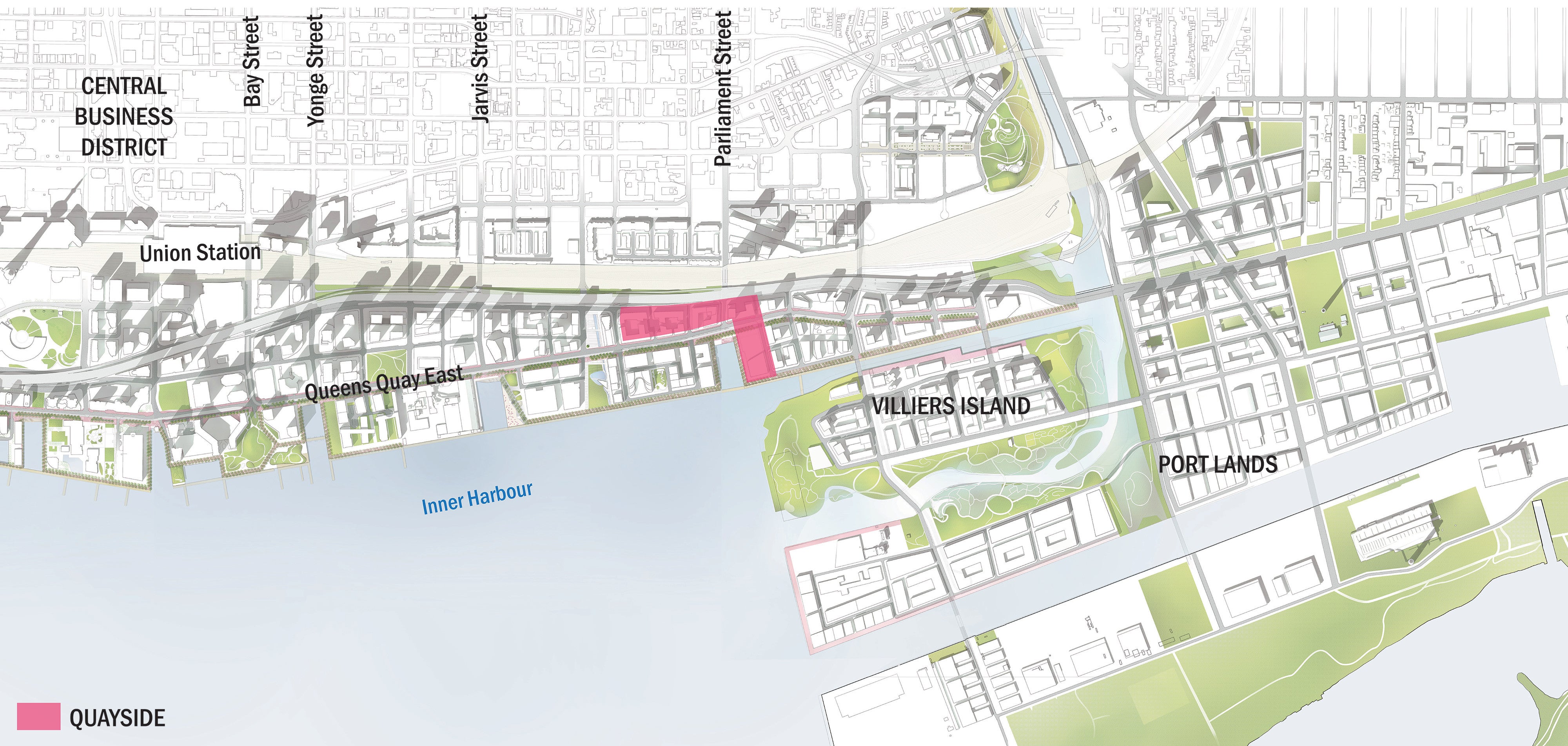Approach to Selecting the Quayside Innovation and Funding Partner: Backgrounder on the Request for Proposal Process

Quayside is an approximate 12-acre underutilized development site located at Parliament Street and Lake Shore Boulevard East, within walking distance of Toronto’s vibrant downtown.
Clarification: An image within this blog illustrating the oversight of the RFP process has been updated with a more precise description of the role played by the Board of Directors. The graphic originally described the Board’s role as “Approve the final selection” and has been updated to “Approval to enter into the Framework Agreement” to better specify the Board’s role in the process.
Phase One: Pre-RFP - Market Sounding and Outreach
During the year leading up to drafting the RFP, we engaged in research, aided by our consultants including KPMG and ARUP Canada, to test our thinking and better understand the current state of mind in the marketplace. This research included market sounding interviews with more than 50 companies and institutions. Each two-hour meeting followed the same format, including a presentation on our vision and objectives for Quayside, as well as a structured discussion to understand the market’s enthusiasm for our innovative approach. On November 11, 2016, Waterfront Toronto also hosted the “Going to Scale Summit” to deepen our understanding of the market and further validate the findings and observations from the market soundings. More than 50 organizations from across industry, academia, Toronto’s innovation ecosystem and the not-for-profit sectors participated in the Going to Scale Summit.Phase Two: Drafting the RFP and Evaluation Criteria
In late-2016, Waterfront Toronto was in the process of completing its Resilience and Innovation Framework for Sustainability. This framework articulates Waterfront Toronto’s overarching policy objectives on sustainability and became an integral part of the vision for Quayside and a consideration in the RFP. In addition, global professional services firm KPMG provided its expertise in creating the evaluation framework. Prior to releasing the RFP, the draft document underwent a legal review by Dentons, the legal firm retained to provide procurement legal advisory services throughout the process.Phase Three: RFP Release and Promotion
The RFP was released to the global marketplace on March 17, 2017. At this point a strict procurement black‐out period came into effect for the duration of the procurement process. This blackout ensured that the procurement process was fair, open and transparent to all Proponents; and, there was no communication between Waterfront Toronto, its consultants or contractors and the Proponents apart from the RFP procurement contact (the “Process Manager”) noted in the RFP document during the blackout period. The RFP was disseminated and promoted through a variety of methods, including MERX (Canada's electronic tendering service). To broaden reach, additional promotional efforts were applied, including:- Canada News Wire (Canadian Comprehensive Technology Package): National distribution;
- Intelligent Community Forum Canada Newsletter: Distribution to 1,400+ tech companies and economic development professionals across Canada;
- MIPIM (largest global real estate trade show held in Europe): presentations to international audiences, including keynote plenary;
- UK Property Forum: distribution to over 60,000 members;
- LinkedIn: targeted campaign to an international audience (including UK, UAE, France, Germany, Netherlands, Singapore, Hong Kong). Total impressions of approximately 61,500; and,
- Waterfront Toronto: promoted across its digital and social media channels.
- The Globe and Mail
- BNN (Business News Network)
- Bloomberg Canada News
- Metro News
- Daily Commercial News
Phase Four: RFP Evaluation and Selection Process
The Quayside Innovation and Funding Partner was selected through a Request for Proposal (RFP) with a Best and Final Offer (BAFO) process. This multi‐stage process provides for discussions and negotiations through Commercially Confidential Meetings. In addition to the seven (7) member Evaluation Committee comprised of Waterfront Toronto staff from a variety of disciplines, the process was overseen by a seven (7) member Steering Committee comprised of representatives from Waterfront Toronto’s Board of Directors and executive team, as well as external subject matter experts with deep experience in sustainability, resilience, urban innovation, entrepreneurship and urban planning.
The table above details the variety of participants involved in the evaluation and selection process.
The major steps in this RFP process were:- Issuance of RFP to market (local, national and international)
- Optional briefing meeting for potential bidders (attended by approximately 16 companies).
- Initial Submissions by Proponents
- Evaluation and shortlist (3 to 5 based on rank order)
- Approval of shortlist by Steering Committee
- Commercially Confidential Meetings and Negotiations
- Issuance of final submission requirements
- Submission of Best and Final Offers (BAFO) by Proponents
- Evaluation and selection of successful Proponent
- Approval of successful Proponent by Steering Committee
- Approval by Waterfront Toronto Board


